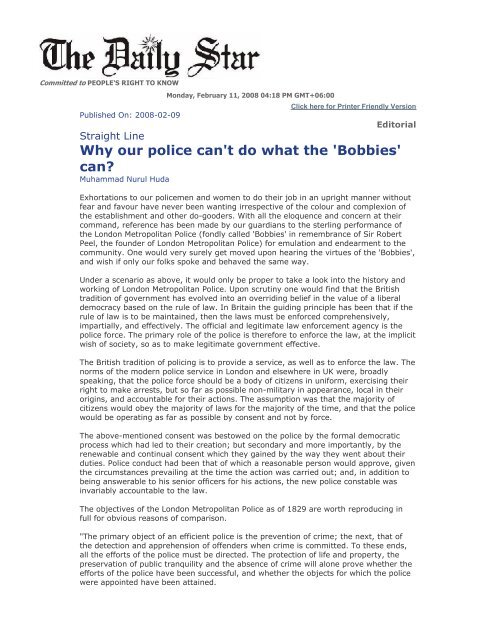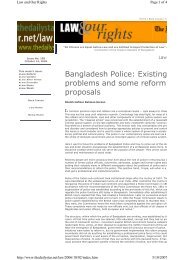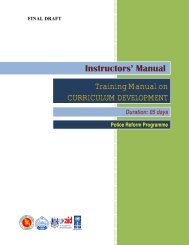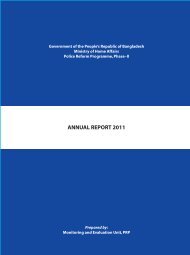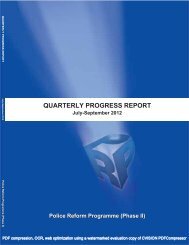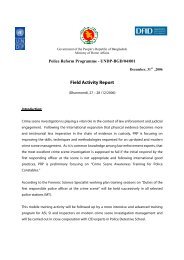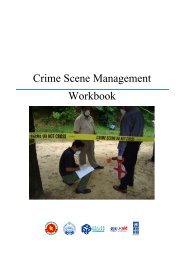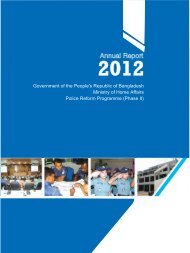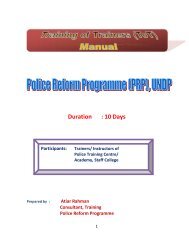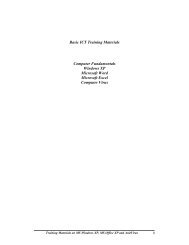Quarterly Progress Report: January-March--2008 - Police Reform ...
Quarterly Progress Report: January-March--2008 - Police Reform ...
Quarterly Progress Report: January-March--2008 - Police Reform ...
You also want an ePaper? Increase the reach of your titles
YUMPU automatically turns print PDFs into web optimized ePapers that Google loves.
Committed to PEOPLE'S RIGHT TO KNOWPublished On: <strong>2008</strong>-02-09Monday, February 11, <strong>2008</strong> 04:18 PM GMT+06:00Click here for Printer Friendly VersionEditorialStraight LineWhy our police can't do what the 'Bobbies'can?Muhammad Nurul HudaExhortations to our policemen and women to do their job in an upright manner withoutfear and favour have never been wanting irrespective of the colour and complexion ofthe establishment and other do-gooders. With all the eloquence and concern at theircommand, reference has been made by our guardians to the sterling performance ofthe London Metropolitan <strong>Police</strong> (fondly called 'Bobbies' in remembrance of Sir RobertPeel, the founder of London Metropolitan <strong>Police</strong>) for emulation and endearment to thecommunity. One would very surely get moved upon hearing the virtues of the 'Bobbies',and wish if only our folks spoke and behaved the same way.Under a scenario as above, it would only be proper to take a look into the history andworking of London Metropolitan <strong>Police</strong>. Upon scrutiny one would find that the Britishtradition of government has evolved into an overriding belief in the value of a liberaldemocracy based on the rule of law. In Britain the guiding principle has been that if therule of law is to be maintained, then the laws must be enforced comprehensively,impartially, and effectively. The official and legitimate law enforcement agency is thepolice force. The primary role of the police is therefore to enforce the law, at the implicitwish of society, so as to make legitimate government effective.The British tradition of policing is to provide a service, as well as to enforce the law. Thenorms of the modern police service in London and elsewhere in UK were, broadlyspeaking, that the police force should be a body of citizens in uniform, exercising theirright to make arrests, but so far as possible non-military in appearance, local in theirorigins, and accountable for their actions. The assumption was that the majority ofcitizens would obey the majority of laws for the majority of the time, and that the policewould be operating as far as possible by consent and not by force.The above-mentioned consent was bestowed on the police by the formal democraticprocess which had led to their creation; but secondary and more importantly, by therenewable and continual consent which they gained by the way they went about theirduties. <strong>Police</strong> conduct had been that of which a reasonable person would approve, giventhe circumstances prevailing at the time the action was carried out; and, in addition tobeing answerable to his senior officers for his actions, the new police constable wasinvariably accountable to the law.The objectives of the London Metropolitan <strong>Police</strong> as of 1829 are worth reproducing infull for obvious reasons of comparison."The primary object of an efficient police is the prevention of crime; the next, that ofthe detection and apprehension of offenders when crime is committed. To these ends,all the efforts of the police must be directed. The protection of life and property, thepreservation of public tranquility and the absence of crime will alone prove whether theefforts of the police have been successful, and whether the objects for which the policewere appointed have been attained.


